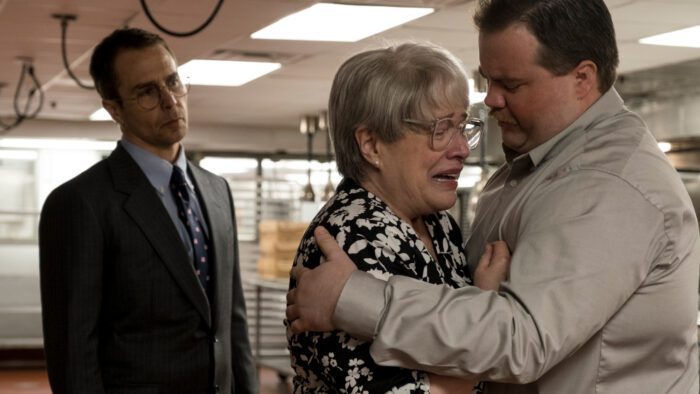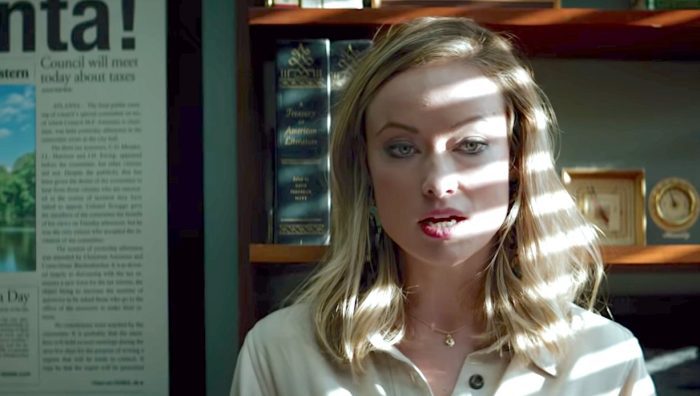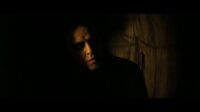Alfred Hitchcock once talked about the difference between surprise and suspense with filmmaker Francois Truffaut. In regards to surprise, he questioned its fleeting nature. For example, two characters sit at a table and discuss virtually nothing of importance. Unknown to them, or the audience, is the fact that a bomb is attached to the underside of the table. Whilst talking about nothing, the bomb suddenly goes off, and the people die. Hitchcock concludes there would certainly be a jolt of a surprise for the audience but it would last mere seconds and never feel particularly relevant.
But, using the same scenario, he explained suspense:
“The bomb is underneath the table and the public knows it, probably because they have seen the anarchist place it there. The public is aware that the bomb is going to explode at one o’clock, and there is a clock in the décor. The public can see that it is a quarter to one. In these conditions, this innocuous conversation becomes fascinating because the public is participating in the scene. The audience is longing to warn the characters on the screen: ‘You shouldn’t be talking about such trivial matters. There’s a bomb beneath you and it’s about to explode!’ “
He concluded that while the unknown bomb angle would provide a surprising fifteen seconds, the suspense of the audience knowing the bomb is there would last fifteen minutes, a considerably more dramatic length of time. Clint Eastwood, the 89-year old director helming his 38th feature-length film with the release of Richard Jewell, knows that the story he is going to tell in his newest film is, for many, well known and thus lacking narrative surprise.
For those who might not know, the real-life Richard Jewell was a security guard who discovered a pipe bomb at Olympic Centennial Park in 1996 during the Summer Olympic Games in Atlanta, Georgia. Despite Jewell’s discovery, the bomb still went off, killing two people and injuring hundreds more. On a personal note, I can still see swimmer Janet Evans clear in my mind as the bomb went off. A famous video of her being interviewed during the explosion was played quite often during the endless cable news cycle of ’96.
Much like director James Cameron, who had to deal with people knowing the ending to Titanic before the film even started, Eastwood is tasked with recreating a historical event with a known outcome and making it dramatic. Using Hitchcock’s concept as a starting point, Eastwood directs what might be one of his most intense thrillers yet providing suspense by the bucketload.

It’s 1996 and the Summer Olympic Games are in full swing. The city of Atlanta is more than excited to be hosting the world. But outside of the sports results, there isn’t much going on for local news reporters, like Kathy Scruggs (Olivia Wilde), or the FBI field office, with agents like Tom Shaw (Jon Hamm) boringly tasked with observing concerts at the crowd-pleasing Centennial Park.
However, security guard work is easy to come by and the over-eager Richard Jewell (Paul Walter Hauser), a former Sheriff’s Deputy and college campus officer, has found a consistent job at Centennial Park. Previous let go of his other jobs for abuse of power and overstepping the boundaries of jurisdiction, Jewell takes his security job perhaps too seriously, with local law enforcement often rolling their eyes at the portly man’s military-like approach to the job.
One night, during a Jack Mack and the Heart Attack concert for thousands of spectators, Jewell discovers a suspicious package which is later confirmed to contain explosives. Jewell is key in pushing people to safety but the bomb goes off, spraying shrapnel on the crowd, killing two and injuring thousands. Jewell is considered a hero…until the FBI comes along.
Named as the prime suspect for the terrorist attack by Agent Shaw, Jewell goes through a taxing investigation that pushes him to the edge. His mother, the kind and loyal Bobi (Kathy Bates), struggles with the on-going pressure from a hounding news media, led by the intrepid, and ethically dubious, Scruggs. Luckily, Jewell has lawyer Watson Bryant (Sam Rockwell) as his defender, insisting on Jewell’s innocence. But, in the end, is the problematic Jewell, who desires more than anything to be rewarded for his dedication to service, truly innocent?

Paul Walter Hauser is the relative unknown thrust into the spotlight as the titular Richard Jewell and his casting couldn’t be more perfect. Not only does he resemble the real-life Jewell almost to the pound, but his lack of movie star power compared to the likes of Oscar winners Rockwell and Bates as well as perennial stars Hamm and Wilde, allows the audience to buy into the underdog story of Jewell being in way over his head.
Usually cast in supporting roles, with a brilliant turn in I, Tonya being the most notable, Hauser does not disappoint as the sometimes frustrating, often-funny Jewell. And that previously mentioned supporting cast provides him terrific support. Like most Eastwood films, in which a dedication to character takes precedence over action or plot, this is a true ensemble acting drama, performed to perfection and ease. There is no Oscar-bait attention-grabbing or flash. Everyone simply provides solid ham-and-egger work to sell the picture.
Eastwood’s output in the early to mid-’90s and, most especially, the entirety of the ’00s, was a period of prestige for the legendary actor and then consistent but not outstanding director. After helping redefine the Western with 1992’s Unforgiven and taking more serious turns with The Bridges of Madison County in 1995, Eastwood hit his true directing peak starting in 2003 with Mystic River, followed by Million Dollar Baby (2004), Letters From Iwo Jima (2006), Changeling (2008), Gran Torino (2009), and Invictus (2009). All of the films mentioned, outside of the critically and commercially successful Gran Torino, were contenders for major awards, not only of the Best Picture and Best Director variety but for the participating actors as well.
Despite a mixture of success from 2010 onward, including the heralded American Sniper (2014), Eastwood felt like he was trying to manufacture the prestige he so easily came by during that amazing run in the ’00s. Projects like J. Edgar (2011), Sully (2016), and The 15:17 to Paris (2018) felt rigged for Oscar gold but couldn’t pull off the emotional connection. Richard Jewell is Eastwood’s return to an earlier form, where the substance of the characters takes precedence over anything else.

That isn’t to say Eastwood doesn’t deliver the goods on a production front. For one, the production design by Kevin Ishioka, who has worked on period-specific films like Dunkirk and Windtalkers, flawlessly recreates 1996 Atlanta. While researching for this review, I sometimes couldn’t tell the difference between the archival news footage and scenes from the film.
And, as I mentioned above, Eastwood’s use of suspense, in the Hitchcockian tradition, is masterful. The film is essentially divided into two parts: the bombing and the investigation. The bombing sequence rivals The Hurt Locker for tension. We, as the audience, know the bomb is there. We know it is going to go off. But since the characters do not, there is a supremely uncomfortable thirty minutes when you know something bad is going to happen. Eastwood doesn’t ramp up the score to manipulate the audience nor does he give any visual cues. The bomb is going to go off and we don’t know exactly when. Brilliant stuff from the man behind the camera, pushing 90 but losing none of his edge.
I saw the film with an older audience, likely drawn not only to the event that occurred over 20 years ago but to Eastwood himself. And the response from the crowd was impressive. Not only did it get a standing ovation but one viewer sitting behind me kept exclaiming “that was really, really good”. I was less vocal but equally as moved. I felt like I was in a theater again, circa 2005, being floored by Million Dollar Baby. It is a true return to form. I’m not sure it will have legs outside of an older audience but Eastwood, after all he’s done, still deserves your attention regardless of a targeted audience.



